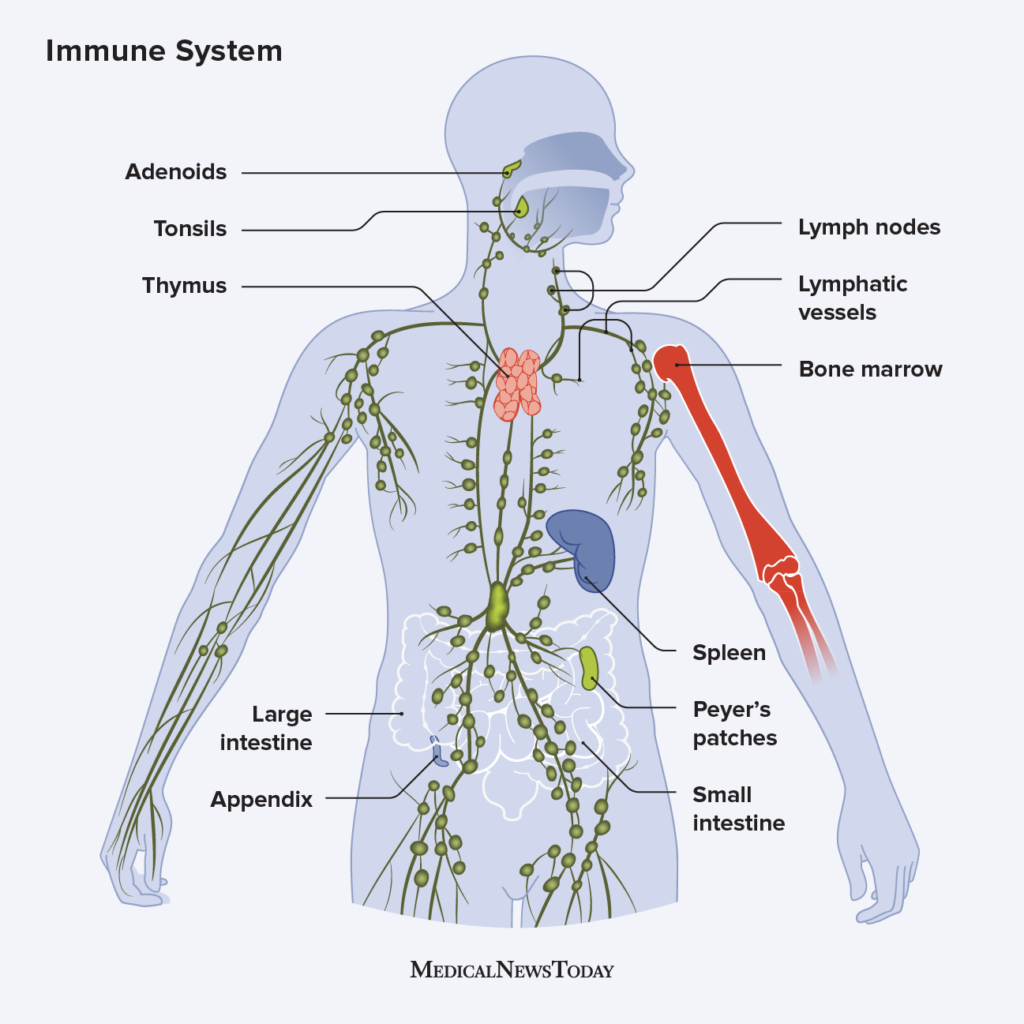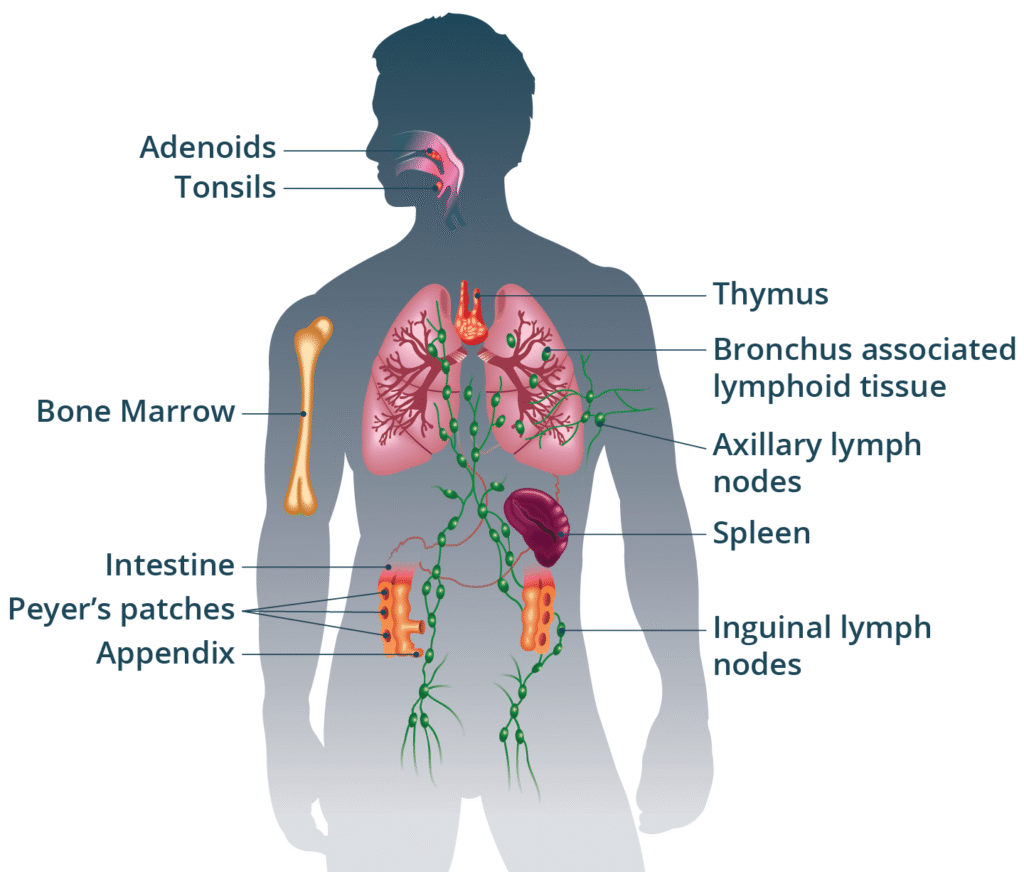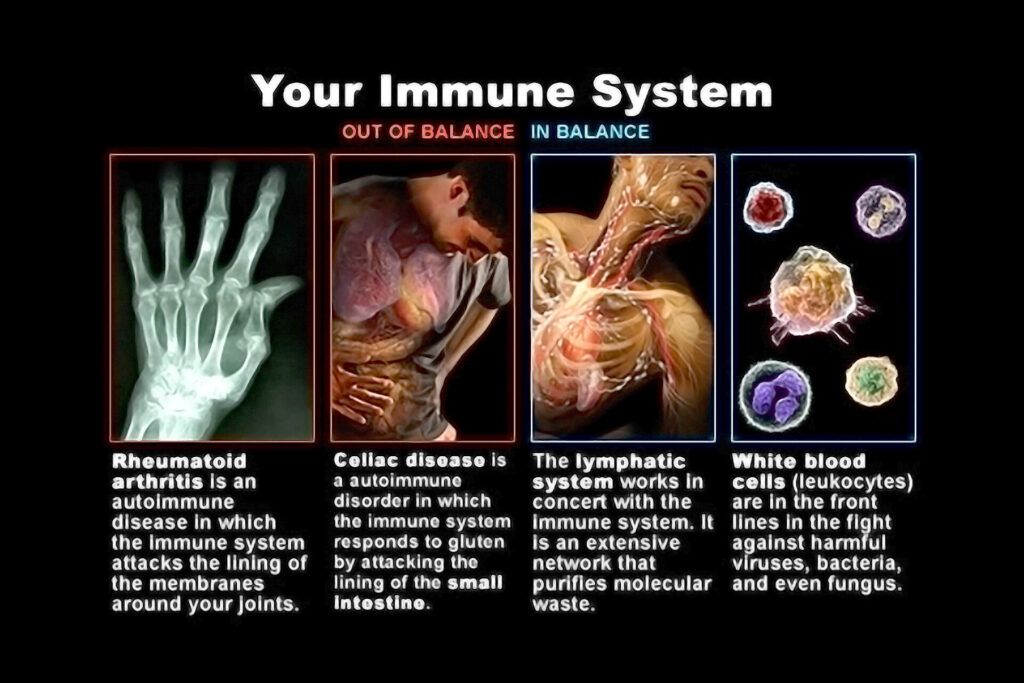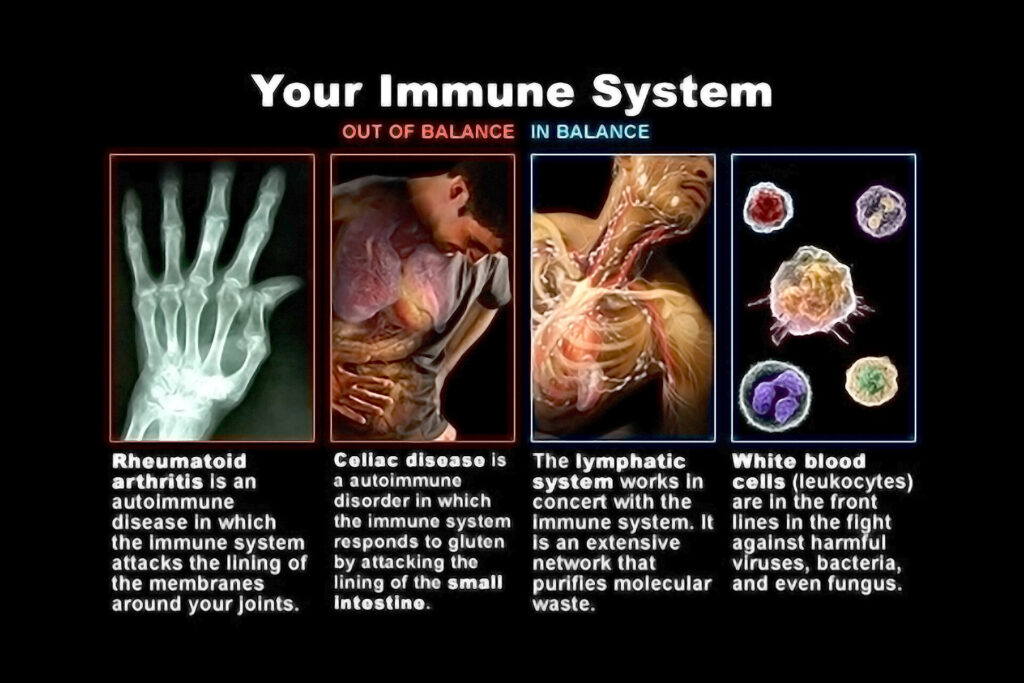
The immune system is the body’s defense network of cells, tissues, and organs that identifies and eliminates infections, toxins, and abnormal cells. It operates through the innate and adaptive systems, ensuring rapid response, long-term protection, and balance to maintain overall health.
Key Takeaways
- Innate immunity provides immediate, non-specific defense through barriers and immune cells.
- Adaptive immunity builds specific, long-term protection using antibodies and memory cells.
- Key organs include bone marrow, thymus, spleen, lymph nodes, and mucosal tissues.
- Immune functions include pathogen elimination, immune surveillance, memory formation, and regulation.
- Immune dysfunction causes allergies, autoimmune diseases, or immunodeficiencies.
- Optimal immunity requires proper nutrition, sleep, exercise, stress control, and hygiene.
The Immune System Overview
The immune system is the body’s natural defense mechanism, designed to protect against infections, diseases, and harmful invaders. It consists of a complex network of cells, tissues, and organs that work together to identify, neutralize, and eliminate threats. This system not only fights off pathogens but also plays a crucial role in healing and immune regulation, ensuring that the body maintains a balanced response to potential dangers.
The immune system operates through two main components that work in harmony to provide comprehensive protection:
- Innate Immune System : The body’s first line of defense, offering a rapid but non-specific response to pathogens. It includes physical barriers like the skin, chemical defenses such as enzymes, and immune cells that quickly react to invaders.
- Adaptive Immune System: A more specialized defense that develops over time, recognizing specific pathogens and creating immune memory. This allows for a stronger and faster response upon repeated exposure, forming the basis of long-term immunity and vaccination.
Key Parts of the Immune System
Understanding the main parts of your immune system gives insight into how your body protects itself everyday.

- Bone Marrow: The factory for all new blood cells, including immune cells. Every immune cell starts life here.
- Thymus: Where T cells mature. Located behind your breastbone, it is most active in childhood.
- Lymph Nodes: Small glands throughout your body that filter out germs and support immune cell communication.
- Spleen: Filters blood, recycles old blood cells, and helps identify bacteria and viruses.
- Mucosal Tissues: The linings of your gut, lungs, and urinary tract are packed with immune cells, ready to respond to threats you breathe in or swallow.
- Neutrophils: The most common white blood cell, these are the first responders.
- Macrophages: Swallow and digest germs and send out signals to alert other immune cells.
- Natural Killer (NK) Cells: Find and destroy infected or cancerous cells.
- T Cells: Target specific threats and help control the immune response.
- B Cells: Produce antibodies, which are proteins that tag invaders so other cells can destroy them.
- Dendritic Cells: Act as messengers between the innate and adaptive immune systems.
Immune System Functions
The functions of the immune system are responsible for safeguarding the body against infections and maintaining internal balance. It carries out multiple essential functions that help detect, neutralize, and eliminate threats while ensuring immune responses are well-regulated.
1. Pathogen Recognition and Elimination
One of the primary roles of the immune system is to recognize and eliminate harmful pathogens such as bacteria, viruses, and fungi. White blood cells, including macrophages and neutrophils, detect these invaders and trigger inflammatory responses to neutralize them. The innate immune system provides the first rapid defense, while the adaptive immune system develops targeted responses for future protection. This process ensures the body can effectively eliminate infections and prevent their spread.
2. Immune Surveillance
The immune system continuously monitors the body for abnormal or potentially cancerous cells. Specialized immune cells, such as natural killer (NK) cells and cytotoxic T-cells, identify and destroy these defective cells before they become harmful tumors. This surveillance mechanism is essential for preventing the development of cancer and other diseases. However, when immune surveillance fails, abnormal cells may evade detection and grow uncontrollably, leading to malignancies.
3. Maintenance of Immune Memory
After encountering a pathogen, the adaptive immune system creates specialized memory cells that “remember” the specific invader. If the same pathogen enters the body again, these memory cells trigger a faster and stronger immune response, preventing reinfection. This mechanism forms the basis of vaccination, where exposure to a harmless form of a pathogen trains the immune system for future defense. Long-term immunity depends on this ability to recognize and respond efficiently to familiar threats.
4. Regulation of Immune Responses
To function optimally, the immune system must strike a balance between fighting infections and preventing damage to the body’s own tissues. Regulatory T cells and cytokines help control the intensity and duration of immune responses, ensuring they are appropriate. An overactive immune response can lead to conditions such as allergies or autoimmune diseases, while an underactive response can make the body vulnerable to infections. Proper regulation is vital for preventing chronic inflammation and autoimmune disorders.
Immune System Conditions
When the immune system malfunctions, it can lead to various conditions that weaken or overactivate its defenses. These conditions can affect how the body reacts to external substances or even how it interacts with its own cells.

1. Allergies
Allergies occur when the immune system overreacts to harmless substances (allergens) such as pollen, dust mites, and certain foods. In response, the immune system releases histamines, leading to symptoms like sneezing, itching, and swelling. In severe cases, an extreme allergic reaction known as anaphylaxis can occur, which can be life-threatening. Common allergic conditions include hay fever, food allergies, and asthma triggered by allergens.
2. Autoimmune Diseases
In autoimmune diseases, the immune system mistakenly attacks healthy tissues, mistaking them for foreign invaders. This leads to chronic inflammation and tissue damage. Some common autoimmune diseases include:
- Rheumatoid Arthritis (RA): A condition where the immune system attacks the joints, causing pain, swelling, and stiffness.
- Lupus (Systemic Lupus Erythematosus – SLE): Affects multiple organs and leads to widespread inflammation and damage.
- Type 1 Diabetes: The immune system destroys insulin-producing cells in the pancreas, leading to high blood sugar levels and dependence on insulin therapy.
3. Immunodeficiencies
Immunodeficiencies arise when the immune system is weakened, making it harder for the body to fight infections. These can be:
- Primary (Genetic): Disorders such as Severe Combined Immunodeficiency (SCID), where individuals are born with defective immune responses.
- Secondary (Acquired): Conditions like HIV/AIDS, which progressively weaken the immune system over time, making individuals more prone to infections and diseases.
Immune System Disorders
Immune disorders can be classified based on how the immune system reacts whether it is overactive, misdirected, or weakened. These disorders can lead to chronic health conditions that require ongoing management.
1. Overactive Immune Responses
When the immune system overreacts to harmless stimuli, it leads to excessive inflammation and tissue damage. Common overactive immune conditions include:
- Asthma: A chronic inflammatory condition affecting the airways, often triggered by allergens or irritants. It causes symptoms such as wheezing, breathlessness, and coughing.
- Eczema (Atopic Dermatitis): A skin condition where excessive immune responses cause redness, itching, and irritation. Environmental triggers like pollen, stress, or chemicals can worsen symptoms.
- Inflammatory Bowel Disease (IBD): A group of conditions, including Crohn’s disease and ulcerative colitis, where immune system dysregulation leads to chronic inflammation of the digestive tract, causing pain, diarrhea, and weight loss.
2. Autoimmune Disorders
When the immune system mistakenly targets the body’s own cells and tissues, it leads to autoimmune diseases. Some significant autoimmune disorders include:
- Multiple Sclerosis (MS): A disease where the immune system attacks the protective covering of nerves in the central nervous system, leading to muscle weakness, vision problems, and cognitive issues.
- Systemic Lupus Erythematosus (SLE): A complex disorder causing widespread inflammation, affecting the skin, joints, kidneys, and other organs. Symptoms vary but may include fatigue, joint pain, and skin rashes.
3. Immune Deficiency Disorders
Immune deficiency disorders make individuals more vulnerable to infections due to a weakened immune system. Examples include:
- Severe Combined Immunodeficiency (SCID): A rare genetic disorder in which the immune system is severely impaired, often requiring bone marrow transplants for survival.
- Common Variable Immunodeficiency (CVID): A condition characterized by low levels of antibodies, making individuals prone to frequent infections, particularly of the lungs and sinuses.
- HIV/AIDS: A viral infection that gradually destroys immune defenses, leading to increased susceptibility to infections and certain cancers.
Conclusion
The immune system is a complex network of cells, tissues, and organs that work together to defend the body against infections, diseases, and harmful invaders. It operates through two main components: the innate immune system, which offers rapid but non-specific defense, and the adaptive immune system, which targets specific threats and develops long-term immunity. Key parts include bone marrow, thymus, lymph nodes, spleen, and various immune cells like T cells, B cells, and macrophages. The immune system identifies and eliminates pathogens, monitors for abnormal cells, maintains immune memory, and regulates responses to prevent overactivity.
Malfunctions can lead to conditions such as allergies, autoimmune diseases (like rheumatoid arthritis and lupus), and immunodeficiencies (such as HIV/AIDS and SCID). Maintaining a healthy immune system involves good nutrition, regular exercise, adequate sleep, and managing stress, while avoiding habits like smoking and excessive alcohol consumption.
FAQs
1. What is the difference between innate and adaptive immunity?
Innate immunity acts quickly and is the body’s first defense against germs. Adaptive immunity responds more slowly but learns and remembers how to fight specific threats.
2. How do vaccines help the immune system?
Vaccines train the immune system to recognize and respond to certain diseases without causing the illness itself.
3. What are some common signs of immune system problems?
Getting sick more often than normal, infections that are hard to treat, slow-healing wounds, and ongoing fatigue are common signs.
4. Can poor nutrition weaken the immune system?
Yes. Lacking nutrients such as vitamins C and D or zinc can make you more likely to get sick.
5. Are probiotics good for immune health?
Yes. Probiotics, found in yogurt and fermented foods, help keep your gut bacteria healthy, which supports your immune system.
6. How does exercise affect the immune system?
Regular, moderate exercise helps immune cells move around the body, which can improve your defense against illness.
7. How much sleep do I need for a healthy immune system?
Most adults need between 7 and 9 hours of sleep each night for the immune system to work properly.
8. What lifestyle habits weaken immunity?
Smoking, drinking too much alcohol, eating poorly, not getting enough sleep, and chronic stress can all weaken the immune system.
9. When should I talk to a doctor about immune system issues?
If you have frequent or severe infections, chronic fatigue, or other signs your immune system isn’t working right, see your doctor.
10. Can you boost immunity quickly?
You can’t boost immunity overnight. Consistent healthy habits over time will help keep your immune system strong and balanced.
References
- Goronzy, J. J., & Weyand, C. M. (2013). Understanding immunosenescence to improve responses to vaccines. Nature Immunology, 14(5), 428-436. https://doi.org/10.1038/ni.2588
- Belkaid, Y., & Hand, T. W. (2014). Role of the microbiota in immunity and inflammation. Cell, 157(1), 121-141. https://doi.org/10.1016/j.cell.2014.03.011
- Davidson, A., & Diamond, B. (2001). Autoimmune diseases. The New England Journal of Medicine, 345(5), 340-350. https://doi.org/10.1056/NEJM200108023450506
- Mellman, I., Coukos, G., & Dranoff, G. (2011). Cancer immunotherapy comes of age. Nature, 480(7378), 480-489. https://doi.org/10.1038/nature10673
Dr. Amiah Rainey researches diet–disease relationships with expertise in vitamins, minerals, and biomarker methods. She earned a PhD from Harvard T.H. Chan School of Public Health (2019) and completed a postdoctoral fellowship at the NIH/NIDDK. With ~20 peer-reviewed publications (example) and experience on NIH-funded cohort studies, Amiah translates complex evidence into practical guidance. She advises on study design, evidence grading, and data transparency. Profiles: ORCID, Google Scholar; list affiliations and any disclosures.


